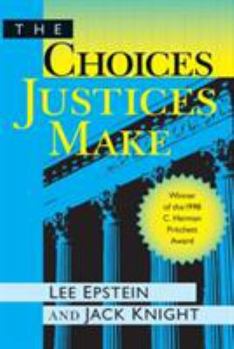The Choices Justices Make
Select Format
Select Condition 
Book Overview
The Choices Justices Make is a groundbreaking work that offers a strategic account of Supreme Court decision making. Justices realize that their ability to achieve their policy and other goals depends on the preferences of other actors, the choices they expect others to make, and the institutional context in which they act. All these factors hold sway over justices as they make their decisions, from which cases to accept, to how to interact with their colleagues, and what policies to adopt in their opinions. Choices is a thought-provoking, yet nontechnical work that is an ideal supplement for judicial process and public law courses. In addition to offering a unique and sustained theoretical account, the authors tell a fascinating story of how the Court works. Data culled from the Court's public records and from the private papers of Justices Brennan, Douglas, Marshall, and Powell provide empirical evidence to support the central argument, while numerous examples from the justices' papers animate the work.
Format:Paperback
Language:English
ISBN:1568022263
ISBN13:9781568022260
Release Date:January 1997
Publisher:CQ Press
Length:224 Pages
Weight:0.72 lbs.
Dimensions:0.5" x 6.0" x 8.9"
Age Range:16 years and up
Grade Range:Grade 11 and higher
Related Subjects
Courts Government Law National Political Science Politics & Government Rules & Procedures TextbooksCustomer Reviews
2 ratings
Great Book, Great Condition.
Published by Thriftbooks.com User , 15 years ago
This book came super fast. Has some usage but still in great condition. Thank you.
Invaluable account of the Court's internal dynamics
Published by Thriftbooks.com User , 19 years ago
The basic accepted truth of modern political scientists (though not always lawyers) is that judges decide cases based primarily upon their policy preferences. The most extreme scholars argue that judges' decisions are based solely on this concern and no other. In their wonderful study, Epstein and Knight contend that this attitudinal model is too simplistic; it ignores that basic fact that justices must gather 5 total votes to enact their policy. This fact, they argue, requires justices to engage in strategic interaction that accounts for the choices of others and the institutional context. Thus, they study three different ideas: that justices' actions are directed toward attaining some policy; justices' are strategic; and institutions structure justices' interactions. Epstein and Knight test their contention through examination of the papers of various Burger Court justices. Their findings tend to support the strategic view of judicial behavior. What is important to remember, is that this book is not meant to be the end of the discussion, but rather the beginning. The authors candidly admit that this is meant to open up new avenues of judicial behavior research. This is a central text of modern political scientists and should be read by any serious student of the Court.





